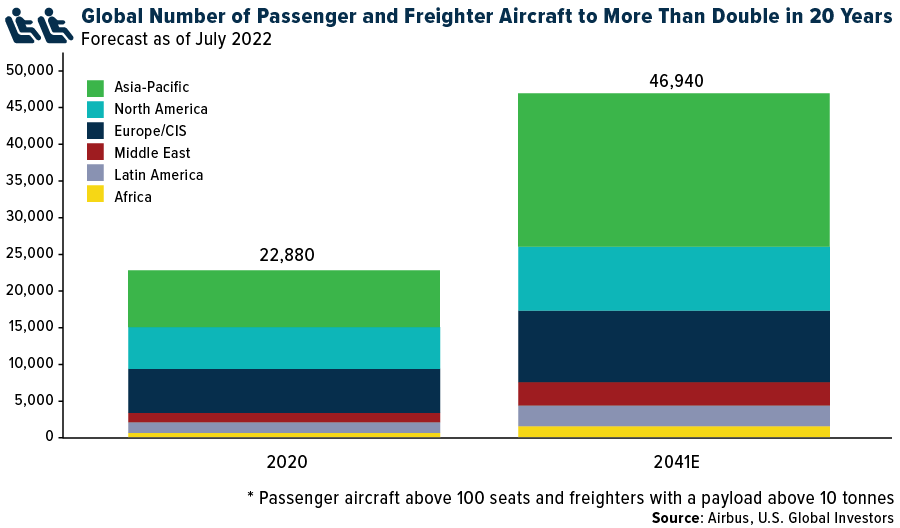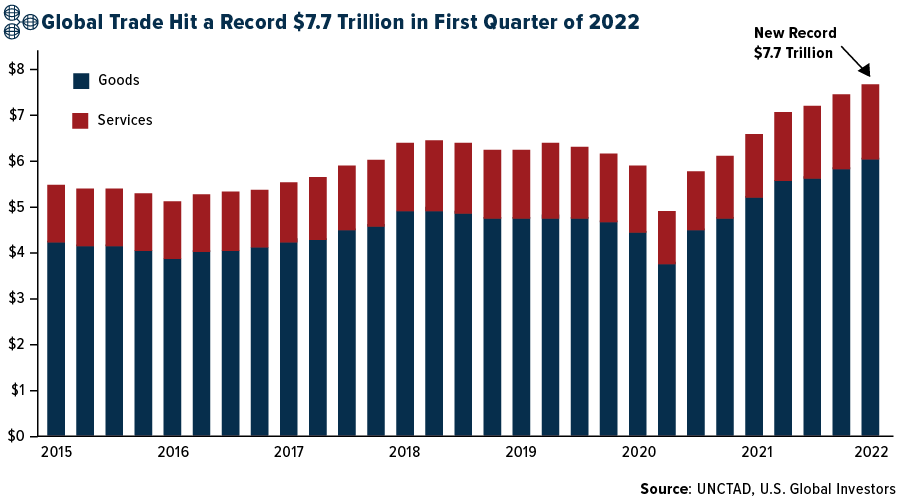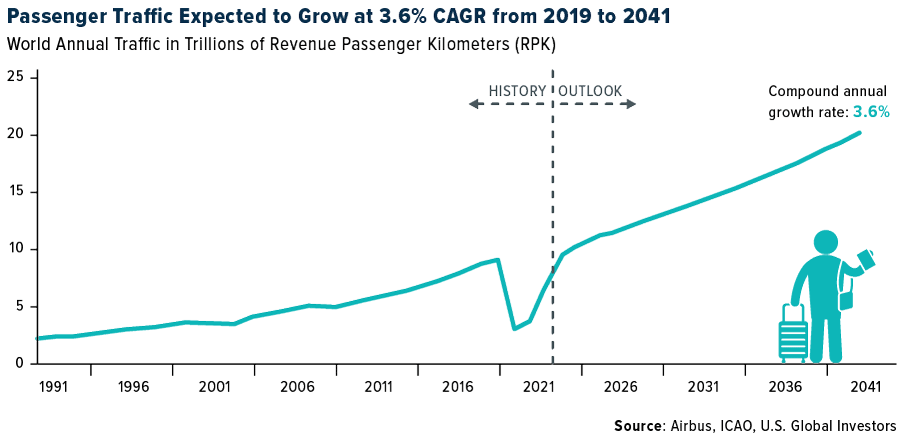The world will need more than double the number of passenger and freighter aircraft by 2041 to meet demand, according to Airbus’s latest outlook. The giant European aerospace company says that nearly 47,000 aircraft could be in service by 2041, which would be a 105% increase from the 22,880 aircraft that were in service at the beginning of 2020.

Only a small percentage of these older jets and planes will remain in the air 20 years from now, Airbus predicts, meaning a vast majority of them will need to be replaced to comply with stricter emissions standards. Today, only around 20% of the total global fleet is represented by next-generation fuel efficient aircraft; by 2041, this figure could be above 95%, Airbus says.
The lion’s share of the growth is projected to occur in the fast-growing Asia-Pacific region, followed by North America, Europe and the Commonwealth of Independent States (CIS), which includes former Soviet states.
Global Trade at a New Record High
Compared to passenger aircraft, freighters make up a relatively small percentage of the global fleet. However, as international trade is expected to double over the next 20 years, the number of freighter aircraft that can carry over 10 tonnes will need to increase to more than 3,000 by 2041, up from a little over 2,000 today.
With inflation running rampant at the moment and a recession imminent, it may seem doubtful to some that trade could double in 20 years. Nevertheless, we’re already seeing the value of internationally traded goods and services soar to new heights. In the first quarter of 2022, global trade hit a new record high of $7.7 trillion, according to just-released data from the United Nations Conference on Trade and Development (UNCTD).
Granted, a big part of this increase in value is due to elevated prices, but we expect to see fresh new quarterly records over time as the size of the global middle class continues to expand.

Passenger Traffic to More Than Double?
Passenger traffic is also projected to more than double over the next 20 years, Airbus says, necessitating the need for thousands of new and improved aircraft. Between 2019 and 2041, world traffic is expected to grow at a compound annual growth rate (CAGR) of 3.6% and may eventually top a head-spinning 20 trillion revenue passenger kilometers (RPK).

You only thought airports were crowded now.
It’s for this reason that travel hubs will need to be expanded and updated.
Just last week, the U.S. Transportation Department awarded nearly $1 billion to 85 airport projects as part of the government’s $1.2 trillion infrastructure program, approved by Congress last year. This initial $1 billion will be used to fund new terminals, increase gate capacity and add new air traffic control towers, bathrooms, baggage claim areas and more.
Boeing Delivers the Most Aircraft Since 2019
Airbus is scheduled to report first-half results later this month, but for now, the attention is on its U.S. competitor Boeing.
The company, which is moving its corporate headquarters from Chicago to Arlington, Virginia, due to the city’s proximity to Washington, D.C., reported stellar delivery results this week for the second quarter. One hundred twenty-one aircraft were delivered in the three months ended June 30, bring the year-to-date figure to 216 aircraft. Boeing delivered 51 planes in June alone, making it the company’s best month since March 2019.
We like both Airbus and Boeing as the two companies drive innovation to pick up additional global market share. And if Airbus’s projections are correct, there could be a lot of business to go around.
Seeking a way to gain exposure? Explore and discover the U.S. Global Jets ETF (JETS), by clicking here!
All opinions expressed and data provided are subject to change without notice. Some of these opinions may not be appropriate to every investor.
Please carefully consider a fund’s investment objectives, risks, charges, and expenses. For this and other important information, obtain a statutory and summary prospectus for JETS here. Read it carefully before investing.
Investing involves risk, including the possible loss of principal. Shares of any ETF are bought and sold at market price (not NAV), may trade at a discount or premium to NAV and are not individually redeemed from the funds. Brokerage commissions will reduce returns. Because the funds concentrate their investments in specific industries, the funds may be subject to greater risks and fluctuations than a portfolio representing a broader range of industries. The funds are non-diversified, meaning they may concentrate more of their assets in a smaller number of issuers than diversified funds. The funds invest in foreign securities which involve greater volatility and political, economic and currency risks and differences in accounting methods. These risks are greater for investments in emerging markets. The funds may invest in the securities of smaller-capitalization companies, which may be more volatile than funds that invest in larger, more established companies.
The performance of the funds may diverge from that of the index. Because the funds may employ a representative sampling strategy and may also invest in securities that are not included in the index, the funds may experience tracking error to a greater extent than funds that seek to replicate an index.
The funds are not actively managed and may be affected by a general decline in market segments related to the index. Airline Companies may be adversely affected by a downturn in economic conditions that can result in decreased demand for air travel and may also be significantly affected by changes in fuel prices, labor relations and insurance costs.
Compound annual growth rate, or CAGR, is the mean annual growth rate of an investment over a specified period of time longer than one year. Revenue Passenger Kilometers (RPK) or Revenue Passenger Miles (RPM) is an airline industry metric that shows the number of kilometers traveled by paying passengers. It is calculated as the number of revenue passengers multiplied by the total distance traveled.
Fund holdings and allocations are subject to change at any time. Click to view fund holdings for JETS.
Distributed by Quasar Distributors, LLC. U.S. Global Investors is the investment adviser to JETS.
